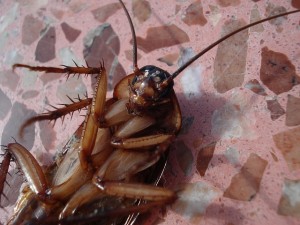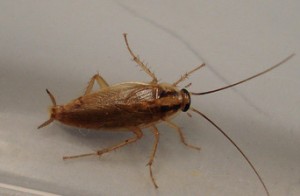“I’m not dead. . . I don’t want to go in the cart.”
 That’s what the old man exclaimed when someone brought him to the “death cart,” where a man repeatedly yelled out, “Bring out your dead! Bring out your dead!” in the 1975 classic film Monty Python and the Holy Grail. A conversation continues between the three as to whether the man should or should not go on the cart.
That’s what the old man exclaimed when someone brought him to the “death cart,” where a man repeatedly yelled out, “Bring out your dead! Bring out your dead!” in the 1975 classic film Monty Python and the Holy Grail. A conversation continues between the three as to whether the man should or should not go on the cart.
Cockroaches don’t die easily. Many attempts are made to rid roaches from homes and businesses, but they do not go away easily, which is why millions have turned to pest management professionals to eliminate them from structures. Instead, they mock you with their presence in your home or facility, proclaiming, “I’m not dead yet!”
Why don’t they die easily? Several reasons:
A cockroach can live without its head for several days
It’s not a myth — it’s a reality. Some entomologists say that roaches can live for up to a month without its head. Others have said that it can live nine days without its noggin. Despite the length — whether it is a week or up to a month — the statistic is, nonetheless, disturbing.
The reason for this is because cockroaches do not need their heads to breathe. Instead, they breathe through spiracles in each of their body segments. Their blood pressure is different from other creatures, such as mammals. Therefore, they do not bleed uncontrollably.
Thus, if you want them to die a month from now, round them all up and rip off their heads. If you want them to die sooner, call a pest management professional. Additionally, catching all the roaches will prove to be a daunting task.
Cockroaches can survive a nuclear attack
Atomic bombs dropped on Hiroshima and Nagasaki gave evidence to this belief, as cockroaches were among the very survivors. Mythbusters tested this theory as well. A month after they “bombed” the roaches, half of them were still alive.
So in case you were considering it, do not try using nuclear bombs or missiles to rid your home of the insects. This may raise some concerns with Homeland Security. On a related matter, enriching uranium to kill cockroaches can be expensive.
Cockroaches multiply quickly
This is not to suggest that cockroaches are good at arithmetic, because there haven’t been any credible studies showing how good or bad they are at mathematics. Rather, they reproduce quickly.
German cockroaches, for example, are professional rapid reproducers. The female can drop four to eight egg capsules in her lifetime. Each egg capsule contains thirty to forty eggs, hatching out in less than a month, usually. And you thought rabbits multiply quickly.
Because of their rapid reproduction, roaches quickly infest a structure, making it difficult to keep up with their growing population. Their strength is in their numbers.
Cockroaches eat anything organic
While you may have many criticisms concerning cockroaches, you can’t say that they’re picky eaters; they’re not. Also, by “organic,” we don’t mean that they avoid GMOs for health reasons. Rather, these omnivores eat anything that is carbon-based.
They eat anything organic, which includes (but is not limited to) grease, sweets, meats, starches, sewage, decaying wood, goetta, pizza (with or without anchovies), and chicken parmigiana with a side of asparagus.
They have even been known to eat paper, clothing, and hair. They eat other cockroaches as well as their own droppings. Therefore, with these appetites, roaches usually don’t have to scavage far to find food; it is readily available and plentiful.
While removal of these items is best, sealing food containers and proper sanitation are great ways to help control cockroaches. Starving them to death will not be an easy task. Also, don’t use their appetite as an excuse not to clean your kitchen.
Cockroaches are thigmotropic
Thigmotropic means that the roaches like to feel a solid surface on the sides of their bodies, preferably on all sides. They like to be touched. But this doesn’t mean that you should let your children pick them up and pet these nasty disease carriers.
Because they prefer such environments, they hide in tight spaces, in cracks and crevices in walls and other out of the way areas — areas in which they are hard to find in order to kill them.
So if you want to play hide and seek, don’t play the game with a cockroach, as you will lose the game if you are a seeker.
Cockroaches are fast
“I feel fine. . . I think I’ll go for a walk.” (Yes, another Monty Python reference). Or, maybe, “I think I’ll go for a run.”
While we don’t know how well they would do in a long distance marathon, we do know that roaches are great sprinters. They have been known to sprint at 80 centimeters per second. That’s considerably fast for a half inch long roach.
Chasing them down and smashing them with a shoe may be satisfying when you succeed at squashing them, but your level of success in doing so may not be too satisfying.
Other Interesting Roach Facts:
- A cockroach can hold its breath for 40 minutes. If you want to drown one, you’ll have to keep it under water for a long time.
- The world’s largest cockroach is about six inches long, with a wingspan measuring about 12 inches.
- Roaches can live for a month without food, but only a week without water.
- The female cockroach has to mate only once in order to reproduce. She carries the male’s sperm inside her for the rest of her life.
- Genetically, the termite is a cockroach’s cousin.

